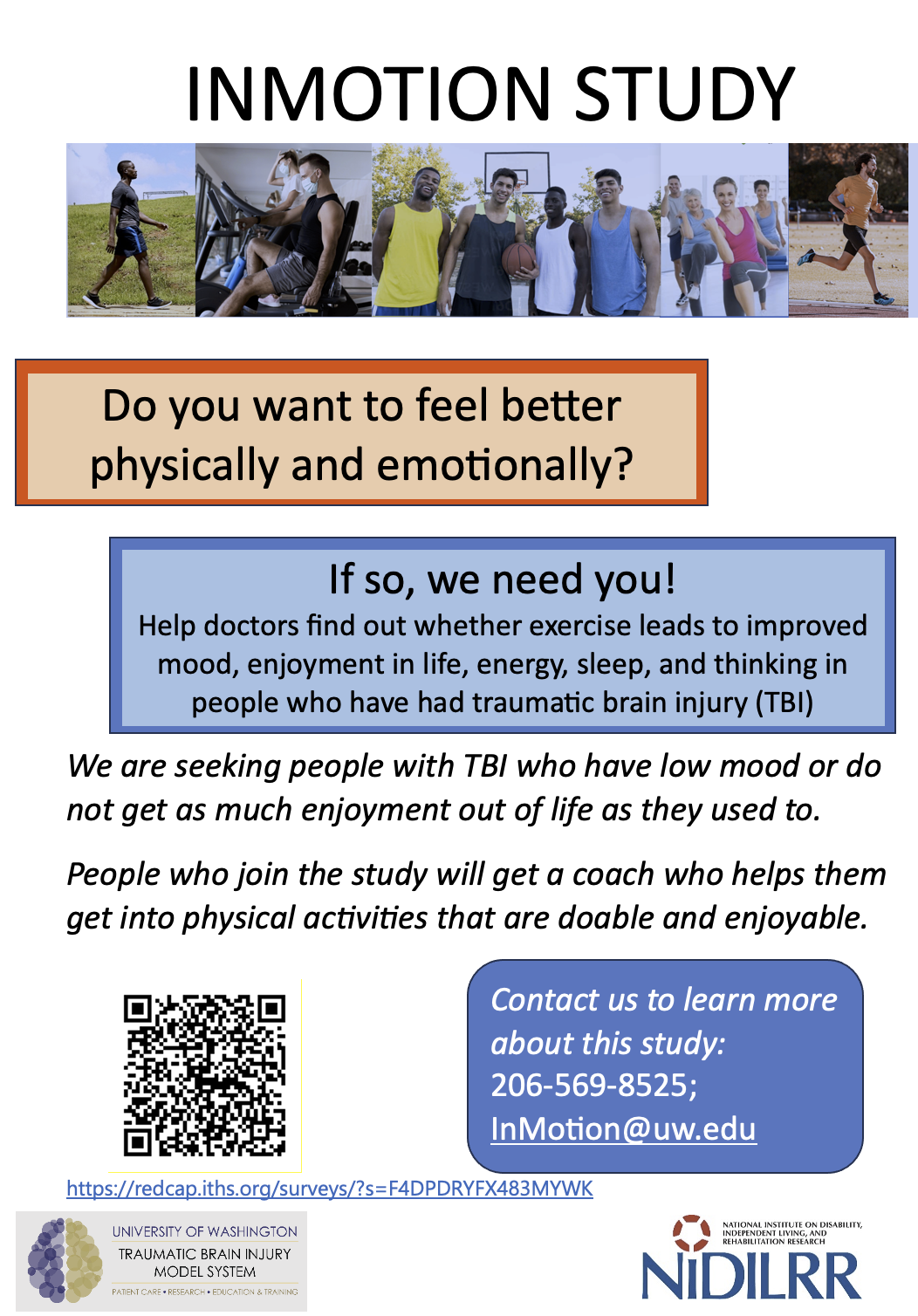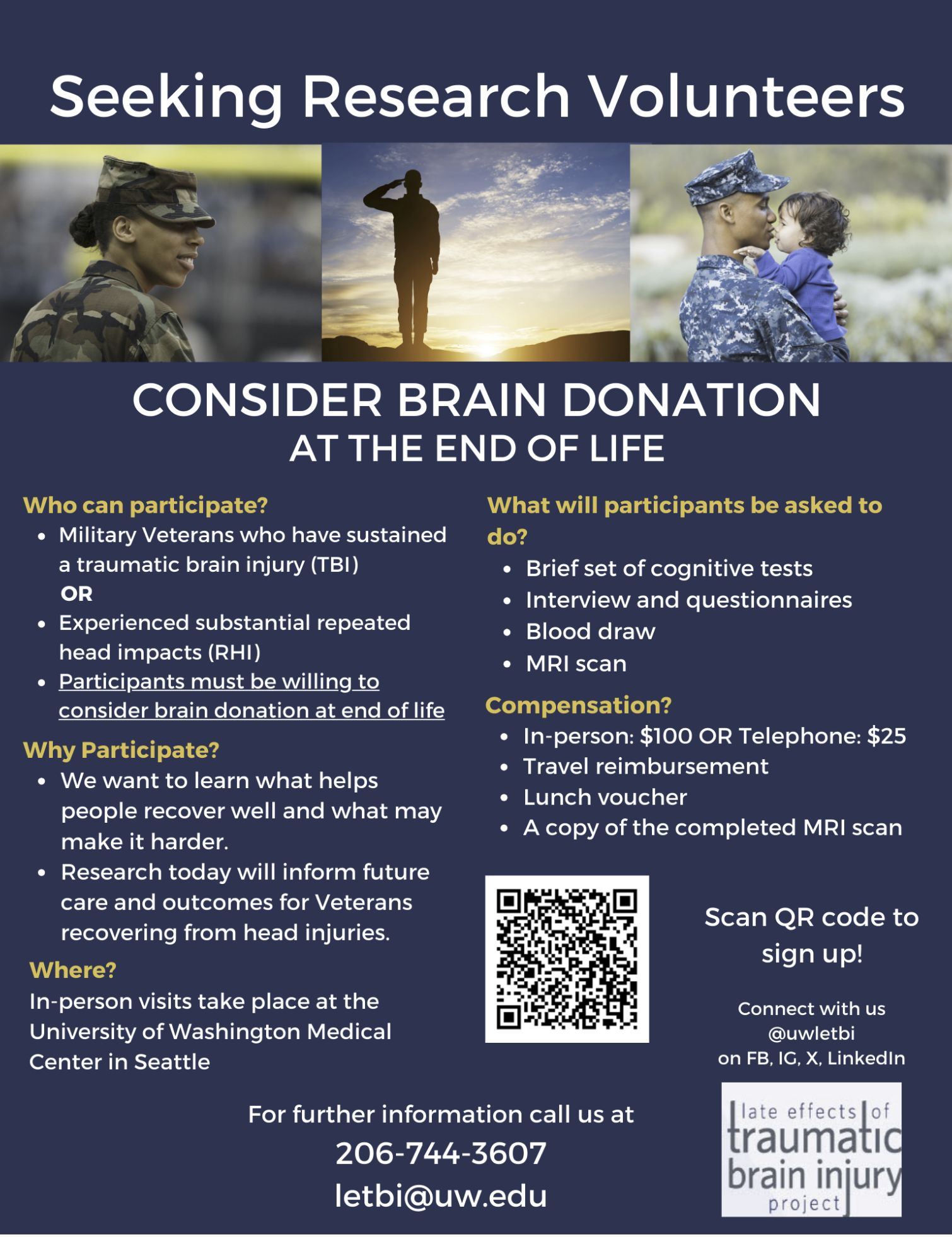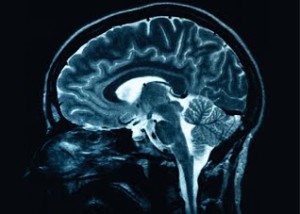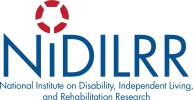Traumatic Brain Injury Model System
The University of Washington Traumatic Brain Injury Model System is one of 16 NIDILRR funded Model System centers in the United States. The UW TBI Model System is a longitudinal study of people who have experienced TBI that seeks to answer questions about recovery from brain injury and what happens to patients after a TBI.
This study only recruits patients currently receiving care on the inpatient rehabilitation unit at Harborview or the UW Medical Center.
Please contact: Erica at (206) 897-6322 or email ericaw8@uw.edu for additional information.
ACTIVELY ENROLLING ! ACTIVELY ENROLLING !
The InMotion Study – A TBI Model System Collaborative Project

We want to learn whether people who have had a TBI and are experiencing depression will feel significantly better if they have access to a telehealth coach who helps them become more physically active. The coach will help participants gradually take part in physical activities that they enjoy and can do in their daily lives such as brisk walking, jogging, swimming, playing sports, or even weight-lifting or dancing! This study will help us learn whether this treatment program, called InMotion, improves mood, enjoyment, energy, sleep, pain, anxiety, and quality of life.
The InMotion study is recruiting people who are already enrolled in the TBI Model System through the Rocky Mountain Regional TBI Model System (Craig Hospital), Northern New Jersey TBI Model System (Kessler), New York TBI Model System (Mount Sinai), North Texas TBI Model System (Baylor) or the University of Washington TBI Model System.
Please email inmotion@uw.edu to learn more.
ACTIVELY ENROLLING ! ACTIVELY ENROLLING !
Learn more about LETBI by filling out our contact information form here.
Late Effects of Traumatic Brain Injury (LE-TBI) and Late Effects of Traumatic Brain Injury in Military Veterans (LE-TBI-MIL) Studies

The LE-TBI and LE-TBI-MIL studies aim to enhance our understanding of traumatic brain injury (TBI) and its relationship to aging. We seek insights into why some individuals with TBI experience minimal issues as they age, while others encounter greater difficulties. Participation involves an interview covering health, functioning, and independence, along with neuropsychological testing, an MRI scan, and a blood draw for genomic analysis. Participants are asked to come back in for the same procedures every 2-3 years so we can follow you over time.
This study is unique in that it involves brain tissue donation– traumatic brain injury has never been studied with brain autopsy as a major focus. Those individuals who pass away during the course of the study and who consent to brain donation will undergo additional neuroimaging and an extensive neuropathological exam using techniques designed to identify specific proteins involved in TBI.
Compensation is $100 for each visit and there is reimbursement for travel and parking expenses.
LE-TBI is a collaborative project between the University of Washington, Harvard/Massachusetts General Hospital and led by Mount Sinai and is sponsored by the Foundation for the National Institutes of Health. LE-TBI MIL is funded by the US Department of Defense.
We have primarily recruited people who were enrolled in the TBI Model System study during their inpatient rehabilitation at Harborview Medical Center or the University of Washington Medical Center. We have expanded study enrollment to include people who have had a TBI within the general population (enrollment in the TBI Model System study not required). To participate, you must be at least 12 months out from the injury.
LE-TBI-MIL specifically recruits Veterans to build on this research to ensure that findings from brain tissue research are relevant to Veterans and their families, both current and future. You must be at least 12 months out from injury and at least 12 months out from active service.
Learn more about LETBI by filling out our contact information form here.
Please contact: Laurie at (206) 744-3607 or email letbi@uw.edu to learn more about LE-TBI and/or LE-TBI-MIL.
Brain Injury Rehabilitation: Improving the Transition Experience (BRITE)
CLOSED FOR RECRUITMENT
The main goal of the BRITE project is to learn more about two different approaches of transition from the hospital to the community can improve the lives of people with moderate to severe TBI and achieve better results that are important to patients with TBI, their families, and healthcare providers.
In this study patients with TBI discharged from inpatient rehabilitation at one of six national TBI Model Systems sites (University of Washington, Indiana University, Ohio State University, Mount Sinai Hospital, Moss Rehabilitation, and Baylor Institute for Rehabilitation) were randomized (like the flip of a coin) to either the standard discharge plan or the standard discharge plan with additional telephone follow up for the first 6 months after discharge. The project team is comparing patient and caregiver functioning and quality of life at 3, 6, 9, and 12 months after hospital discharge in these two groups.
This study recruited patients from the inpatient Rehabilitation Unit at Harborview Medical Center or the University of Washington Medical Center. This study is funded through a Patient-Centered Outcomes Research Institute (PCORI) Award (PCS-1604-35115).
Characterization and Treatment of Chronic Pain after Moderate to Severe Traumatic Brain Injury
CLOSED FOR RECRUITMENT
The TBIMS Collaborative mechanism, funded by NIDILRR, has allowed us to collect more information from our TBIMS participants on their experience with chronic pain and pain treatment after moderate to severe TBI. Our goal is to learn more about how many people continue to have chronic pain over time, for those with pain or who have had pain after their injury, what treatments they have tried, and for those without chronic pain to learn more about common co-occurring conditions like sleep, mood, and quality of life to compare those with and without pain. The ultimate goal of learning more about the experience of pain after moderate to severe TBI is to improve health and function. The study reached its goal of collecting data on 3,800 individuals from 16 TBIMS civilian centers, one VA TBIMS center, and one TBIMS follow-up center. To learn more about the study, please click here.
TBI Care
CLOSED FOR RECRUITMENT
Comparison of a systematic approach to pain treatment to the usual care approach to reduce the impact of pain in adults who have had a TBI who have chronic pain, including headache. The approach, called Collaborative Care, may also improve treatment of other conditions that happen frequently with chronic pain including depression, anxiety, and sleep. Collaborative Care is a well-established model for providing healthcare, but has not yet been used in persons who have had a TBI.
This study recruited only those who were within the last 12 months, patients followed in the outpatient Rehabilitation Clinic at Harborview Medical Center or the University of Washington Medical Center.
ACCELR8: Physical Activity and TBI
CLOSED FOR RECRUITMENT
This study focuses on physical activity (PA) after TBI because extensive research in the general population indicates that PA has tremendous potential to improve health and functioning. We suspect that people become less physically active after TBI, which may impact recovery as well as other conditions such as mood, cognition, and sleep.
Research has shown the importance of physical activity to improve overall health yet there has been a lack of robust research on physical activity after a TBI. As a result, we are conducting this study to learn more about challenges people who have had a TBI face with meeting their physical activity goals and how that affects their overall health over time.
This study recruited patients who were enrolled in the TBI Model System study during their inpatient rehabilitation at Harborview Medical Center or the University of Washington Medical Center.
Cognitive Trajectories and TBI
CLOSED FOR RECRUITMENT
The Mount Sinai TBI Model System team is leading this study, which will look at patterns of cognitive function over time. Cognitive function, which includes memory and reasoning skills, will be tested at different follow-up points after a person’s injury to get a clearer picture of how it changes over multiple years after a traumatic brain injury.
This study recruited patients who were enrolled in the TBI Model System study during their inpatient rehabilitation at Harborview Medical Center or the University of Washington Medical Center.
Return To Driving After Moderate-Severe TBI: Who, When, Where, and How Safe?
CLOSED FOR RECRUITMENT
Return to driving is a goal for almost every person experiencing TBI. Return to driving after TBI is associated with employment, greater social activity, and higher satisfaction with life. Cognitive deficits present a greater challenge for return to driving than physical deficits in many cases. Despite the importance of a safe return to driving, the threshold for recovery that allows a safe return is uncertain. A better understanding of who returns to driving following moderate-severe TBI, what evaluations (if any) were completed prior to driving, patterns of driving, and the risks involved would aid TBI survivors, family members, and health care providers in determining when, and if, return to driving is a reasonable step.
This study, led by the University of Alabama TBI Model System, aims to improve our understanding of the return to driving after a TBI.
This study recruited patients who were enrolled in the TBI Model System study during their inpatient rehabilitation at Harborview Medical Center or the University of Washington Medical Center. Data collection for this study is ongoing, but recruitment has been completed.
C-SAS
CLOSED FOR RECRUITMENT
Comparison of Sleep Apnea Assessment Strategies to Maximize TBI Rehabilitation Participation and Outcome, also known as the C-SAS study and funded by PCORI compared two methods of sleep apnea diagnosis in participants who experienced a recent TBI. The aims of the study included (Aim 1) a comparison of existing screening and (Aim 2) focused on determining if a more accessible diagnostic test is sufficient to diagnose sleep apnea, compared with the traditional method, which is less accessible.
TWIST Study
CLOSED FOR RECRUITMENT
This study investigated the efficacy of Sumatriptan in treating post-traumatic headache in people who experienced a mild to severe TBI between 2 weeks and 5 years prior.
Sumatriptan has been approved since 1991 for the treatment of migraine headaches. This study examined how effective this medication is at treating post-traumatic headache (PTH). Participants were actively experiencing headaches and completed a daily headache diary.
APP Study: Phase 1
 CLOSED FOR RECRUITMENT
CLOSED FOR RECRUITMENT
The APP study looked into the effectiveness of Amitriptyline in preventing post traumatic headaches in people who experienced a mild TBI (concussion).
The Headache Diary Study, APP: Phase 2
CLOSED FOR RECRUITMENT
This study was investigating the use of a daily headache diary to keep track of headaches after a mild TBI or concussion.
TWILIGHT Study: Treatment with Light Therapy
CLOSED FOR RECRUITMENT
This study, also known as the TWILIGHT study, investigated the efficacy of providing daily phototherapy in the morning to patients who experienced a recent TBI.
This study recruited patients receiving care on the Inpatient Rehabilitation Unit at Harborview Medical Center, but has now completed.
